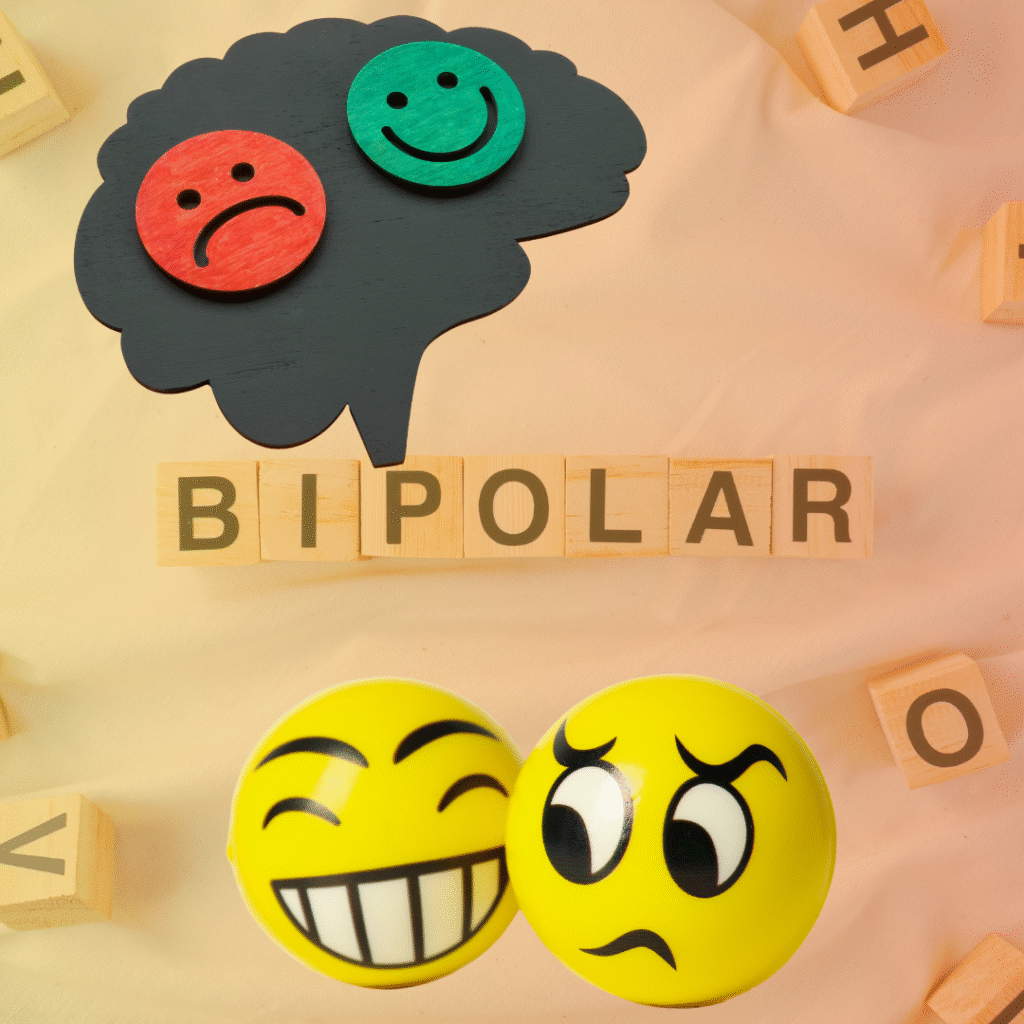Bipolar disorder is a mental health condition marked by extreme mood shifts, ranging from intense highs to deep lows. These changes can disrupt daily life, making early detection important.
A bipolar disorder self-assessment test offers a simple way to recognize possible symptoms. In Kenya, access to reliable tools is improving, with the Mood Disorder Questionnaire (MDQ) standing out as the most effective.
Still, self-assessments are only a starting point. Professional evaluation is essential for accurate diagnosis and proper treatment, ensuring individuals get the support they need to manage bipolar disorder effectively.
Also Read: How to use Post Traumatic Stress Disorder (PTSD) Self Assessment Tool in Kenya
Top Facilities in Kenya Providing Bipolar Screening and Assessment Tools
Bipolar disorder requires accurate screening and early assessment to support long-term stability. Kenya now has several leading mental health facilities offering modern bipolar screening tools, structured assessments, and professional guidance.
Among them, Hera Therapy stands out for its advanced digital tools, expert-led evaluations, and strong patient-centered approach.
1. Hera Therapy
At Hera Therapy, we offer some of the most comprehensive and accessible bipolar screening tools in Kenya. We use clinically aligned digital assessments designed to identify early symptoms, mood patterns, and risk indicators with exceptional accuracy.
We also offer continuous mood tracking, teletherapy sessions, and tailored care plans for individuals who need ongoing support. Our online-first approach makes screening fast, affordable, and fully confidential giving us a clear edge over traditional mental health facilities.
2. Chiromo Hospital Group
Chiromo Hospital Group is one of Kenya’s most established mental healthcare institutions. Their assessment team uses standardized bipolar screening tools, psychiatric evaluations, and detailed mood interviews to ensure accurate diagnosis. They also offer inpatient and outpatient support, making them suitable for clients who require structured monitoring alongside bipolar assessment services.
3. Nairobi West Hospital Mental Health Unit
Nairobi West Hospital provides psychiatric consultations supported by psychological testing to screen for bipolar disorder and other mood-related conditions. Their mental health specialists focus on identifying symptom patterns such as mood swings, sleep disturbances, and cognitive changes.
The hospital combines medical evaluation with follow-up reviews, ensuring patients receive professional guidance throughout their assessment journey.
4. The Nairobi Hospital – Counseling Centre
The Nairobi Hospital’s counseling center offers psychological assessments that help identify early signs of bipolar disorder. Their mental health team uses validated tools, including mood disorder questionnaires and clinical interviews. Their structured approach allows clients to understand their emotional patterns while receiving guidance from certified counselors and psychologists.
5. Mathari National Teaching & Referral Hospital
Mathari Hospital provides psychiatric screening and diagnosis for complex mood disorders, including bipolar disorder. Their evaluations involve psychiatric interviews, behavioral assessment, and medical reviews for individuals experiencing severe or persistent mood disturbances. They serve both walk-in clients and referred patients, particularly those who need comprehensive clinical examinations.
Understanding Bipolar Disorder
Bipolar disorder is a mental health condition characterized by extreme mood changes that go beyond ordinary ups and downs. These mood shifts can range from periods of intense energy, euphoria, or irritability to episodes of deep sadness, fatigue, or hopelessness.
There are two main types of bipolar disorder:
- Bipolar I Disorder: Defined by severe manic episodes that may last at least seven days or require hospitalization. Depressive episodes often follow.
- Bipolar II Disorder: Involves less intense manic phases, called hypomania, combined with prolonged depressive episodes.
In addition to these, there are other forms such as Cyclothymic Disorder (chronic but milder mood swings) and unspecified bipolar-related disorders, where symptoms do not fit neatly into the two main categories but still affect daily functioning.
Understanding the difference between Bipolar I vs Bipolar II is important when interpreting a bipolar 1 vs bipolar 2 test, since the symptoms and severity vary between the two.
What is a Bipolar Self-Assessment Test?
A bipolar self-assessment test is a short questionnaire designed to help individuals recognize symptoms that may be linked to bipolar disorder. These tools ask about patterns of mood, behavior, sleep, and energy levels to highlight whether further evaluation may be necessary.
It is important to understand that self-assessment tools are screening aids, not diagnostic tests. They cannot confirm whether someone has bipolar disorder. Instead, they help you reflect on your experiences and decide if you should seek professional help.
Today, many options exist, including bipolar disorder test free versions and bipolar test online tools that can be completed within minutes. These resources provide a convenient first step, especially for people in Kenya who may be exploring their mental health privately before visiting a clinic or therapist.
The Mood Disorder Questionnaire (MDQ)
One of the most widely used screening tools for bipolar disorder is the Mood Disorder Questionnaire (MDQ). This self-assessment is specifically designed to help identify symptoms and patterns associated with bipolar spectrum conditions.
The MDQ questionnaire for bipolar disorder screening asks about:
- Episodes of elevated or irritable mood
- Changes in energy levels and activity
- Sleep disruptions
- The impact of these experiences on daily life
The MDQ is valued for its simplicity and effectiveness. It can be completed in just a few minutes and gives individuals an initial sense of whether their experiences may align with bipolar disorder. Because of its accessibility, it is often recommended as the best bipolar self-assessment tool in Kenya.
Other Common Assessment Tools for Adult Bipolar Disorder
While the Mood Disorder Questionnaire (MDQ) is the most recognized screening tool, there are several other assessment tools for adult bipolar disorder that can support early identification:
- Bipolar Spectrum Diagnostic Scale (BSDS): Focuses on the broad spectrum of bipolar symptoms, including less obvious or subtle mood changes.
- Young Mania Rating Scale (YMRS): Primarily used by clinicians to measure the severity of manic episodes.
- Hypomania Checklist (HCL-32): Helps detect hypomanic symptoms, making it particularly useful for identifying Bipolar II disorder.
These tools are often used alongside clinical evaluations to provide a clearer picture of someone’s mental health. For individuals in Kenya, many of these questionnaires are available online, making it easier to begin the self-screening process.
Limitations of Self-Assessments
While tools like the bipolar disorder self-assessment test or the MDQ questionnaire are helpful in raising awareness, it is important to remember their limitations. These tests are not diagnostic. They can point out possible symptoms but cannot confirm whether you have bipolar disorder.
Some of the key limitations include:
- Symptom overlap: Conditions such as depression, anxiety, or ADHD may show similar signs, making results less specific.
- Self-reporting bias: Responses depend on how accurately an individual reflects on their experiences.
- No clinical evaluation: A test cannot assess your full medical history, life context, or other mental health conditions.
Because of these factors, online tools should be seen only as a starting point. If your results suggest the possibility of bipolar disorder, the next step should always be consulting a qualified professional for proper evaluation and care.
Hera Therapy: Supporting Your Mental Health Journey
At Hera Therapy, we understand that tools like the Mood Disorder Questionnaire (MDQ) and other bipolar self-assessment tests are only the first step. That’s why we provide our own free online bipolar testing tool to help you quickly screen for possible symptoms from the comfort of your home.
However, self-assessment alone is not enough. What truly makes the difference is professional guidance. Our team offers comprehensive mental health support from accurate diagnosis and therapy sessions to ongoing care tailored to your unique needs.
Whether you are just starting with a bipolar disorder test free online or already suspect you may have bipolar disorder, Hera Therapy is here to walk with you every step of the way. With both in-person and online services across Kenya, we make it easier for you to access the clarity and care you deserve.
Getting Professional Help in Kenya with Hera Therapy
Self-assessment tools like the Mood Disorder Questionnaire (MDQ) provide an accessible way to reflect on your mental health and recognize potential signs of bipolar disorder. While these tests including free and online versions can be useful starting points, they should never replace a professional diagnosis.
At Hera Therapy, we are committed to helping you move beyond screening tools by offering professional evaluation, personalized therapy, and ongoing support. Reach out to Hera Therapy today and take the first step toward understanding and managing your mental health with confidence.


Your article helped me a lot, is there any more related content? Thanks! https://www.binance.info/register?ref=IXBIAFVY
Can you be more specific about the content of your article? After reading it, I still have some doubts. Hope you can help me.
Your article helped me a lot, is there any more related content? Thanks!
Thank you for your sharing. I am worried that I lack creative ideas. It is your article that makes me full of hope. Thank you. But, I have a question, can you help me?
Thanks for sharing. I read many of your blog posts, cool, your blog is very good. https://www.binance.com/es/register?ref=RQUR4BEO
Can you be more specific about the content of your article? After reading it, I still have some doubts. Hope you can help me.
Can you be more specific about the content of your article? After reading it, I still have some doubts. Hope you can help me. https://www.binance.info/register?ref=IHJUI7TF
Thanks for sharing. I read many of your blog posts, cool, your blog is very good. https://accounts.binance.info/fr-AF/register?ref=JHQQKNKN